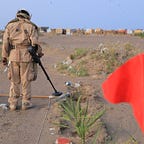As Yemen approaches the end of Ramadan, deminers prepare to return to minefields amid ‘truce’
As Yemen approaches the end of Ramadan, a month for reflection and peace, deminers across the conflict afflicted country are preparing to return to the minefields.
Ramadan is a sacred month-long period of fasting, reflection and community for Muslims.
The United Nations envoy to Yemen, Hans Grundberg, announced Yemen’s warring sides in the seven-year conflict had accepted a two-month truce, starting on the first day of Ramadan (1 April), for the first time in years. While world leaders have voiced cautious optimism for these efforts to end the war, local reports from Yemen’s central city of Marib have detailed how Iran-backed Houthis resumed attacks on the frontlines of Marib just days after the announcement.
With the holy month ending on 2 May, Project Masam’s demining teams will be going back to the field, to clear landmines and other explosive devices, amid halted military operations. The deminers continued to work half of the month of Ramadan before going on standby to observe the holy month.
“The teams have been working very hard, especially during the past months after the Houthi occupation has been pushed back, and very large numbers of landmines have been removed in these areas: the teams get complacent and can lose focus on the job at hand, and that is when accidents occur,” Project Masam’s Operations Manager Retief Horn said from Marib.
“It is very important to give the teams time off during Ramadan as that first of all it allows them time with their loved ones, and that is a great moral booster for anybody away from family and friends for long periods of time.”
Unfortunately, the threat of landmines is more than ever present in high-risk areas of Yemen.
Ramadan landmine incident
While deminers were given time off to observe Ramadan, Masam had nine teams on standby — four in Marib and five on the West Coast with designated areas of responsibility — to tend to any emergency reported by local communities.
In the event of an emergency or report of an accident, the teams were contacted either by the senior local official of the area such as a mayor or police commander or the incident would have been reported to the Yemen Executive Mine Action Centre (YEMAC) who would have then informed Masam’s Operations Manager.
“Once we have received all the information, we will then task the team in that area to attend to the incident,” Horn explained, pointing to an emergency incident reported by locals to Masam on 26 April in Shabwah Governorate in Ain district during which a camel stood on a landmine and died.
Teams 12 and 15 based in Ain and Harib (Marib Governorate), respectively, were dispatched to investigate the accident.
“The latest incident happened out in the desert area which is used by local camel farms to let their camels roam and feed. During their investigation the teams removed 340 anti-tank mines between the two teams,” Horn added, pointing to the fact the latest landmine explosion happened in the same area where Team 2 had a mine accident on 20 March 2022.
Shabwah province has been a central frontline in the conflict between Houthi militias and pro-government forces and have been littered with landmines and other remnants of war.
End of Ramadan refresher training
As both teams are expected to go back to the area on 28 April to carry out further clearance activities, Masam management is busy planning for the return of all deminers after Eid al Fitr, which marks the end of Ramadan.
Indeed, all teams returning after Ramadan will receive their equipment from Masam headquarters, and undergo refresher training where needed, as any teams away from active work for more than 21 days should, according to International Mine Action Standards (IMAS), receive refresher training.
On deployment, the teams will be sent to priority areas first. Priority areas are defined areas that sustain civilian communities including water, food and living areas, followed by access roads to essential services, schools and hospitals.
Uptake is landmine planting
An uptake in landmine planting following rebel Houthi movement’s withdrawal from strategic areas has led Masam teams to clear close to 5,000 banned anti-personnel landmines.
Horn explained: “The biggest compliment on this achievement must go to the teams in finding the mines, as the anti-personnel mines are randomly laid to defend Houthi high ground positions without conventional mine warfare patterns and no minefield marking and/or mapping details to be able to clear all the mines in these areas. That is why anti-personnel landmine clearance is such a long and tedious process, especially without mapping detail.”
While the Operations Manager celebrated “a massive milestone for Project Masam” and a “a huge accomplishment to remove and destroy this large number of anti-personnel mines”, he said this landmark is bitter sweet.
“We all know that there is an international ban on the use and manufacture of anti-personnel mines, but still it is being used and manufactured by the Houthi in Yemen.”
As Masam’s deminers prepare to return to the field after the holy month, they are also facing this very real threat in a country where an estimated two million landmines have been planted since at least 2015.
By Elsa Buchanan
